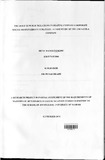| dc.description.abstract | Exposes of unethical and irresponsible conduct of companies have heightened public awareness of the perils involved in the pursuit of economic profitability and social power. Corporations such as Nike and Shell have in the past suffered loss of public confidence following wide publicity oftheir dishonorable conduct such as operating sweatshops in developing countries and contributing to environmental damage while other big corporations such as Enron and WorldCom have outrightly collapsed owing to their social irresponsible practice. This has shifted the thinking of corporations from only serving their economic interest to acting responsibly to the society they owe their very existence to.
However, empirical studies have not exhaustively studied how companies' public relations endeavors shape their corporate social responsibility of which was the focus of this study. To achieve this, the study took The Cola-Cola Company in Kenya as its subject.
This study adopted a case study approach on a target population of staff members in the commercial, public affairs & communication and production departments at the Coca-Cola Company headquarters and its largest franchise, Nairobi Bottlers Ltd. The study then used stratified random sampling technique in coming up with a sample of 150 respondents target population to whom questionnaires were sent for data collection. The study then adopted a descriptive analysis technique from which frequencies, mean and standard deviation were used to analyse the data collected. Presentation of the same was through tables, graphs and charts and explanations presented in prose.
The study found that social responsibility approaches to managing the organization have been the result of many influences, including the federal government's formalized expectations for legal compliance, social and ethical criteria emerging as evaluative tools for customers and business partners and the increased influence of corporate governance issues. The study also established, that CRS had improved the Coca-Cola Company's image in terms of enhancing and adding value for the organisations product and/or services, earning more respect for organizational views - the company is now more likely to be listened to, bringing about differentiation among similar organization and competitive advantages, and making recruitment easier, improved morale and reduced staff turnover. | en_US |

